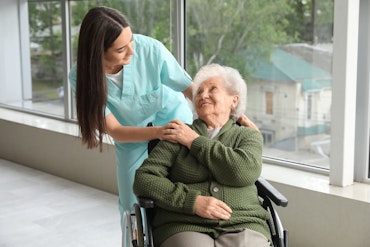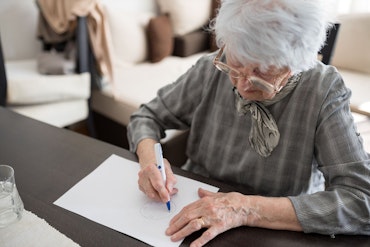Retired public servant facing homelessness after waiting years for priority housing
How discussions at the Federal Parliament could facilitate positive change for vulnerable older Australians looking for secure housing
![<p>With food and rent prices soaring, many Australians are feeling the pinch, particularly older Australians. [Source: Shutterstock]</p>](https://agedcareguide-assets.imgix.net/news/articles/wp/sadwoman2506.jpg?fm=pjpg&format=auto&w=550&q=65)
With food and rent prices soaring, many Australians are feeling the pinch, particularly older Australians. [Source: Shutterstock]
Key points:
- A meeting at the Federal Parliament recently with a delegation from the Housing for the Aged Action Group gives hope to those calling for better housing for older Australians
- Approximately 19,400 Australians over the age of 55 years are currently experiencing homelessness, according to the latest data from the Australian Institute of Health and Welfare
- Ten percent of all Australians seeking specialised homelessness services were over the age of 55 years, as per the latest data from the Australian Institute of Health and Welfare
An Australian public servant forced into an early retirement at 63 has met with ministers at the Federal Parliament to share her story.
Along with a delegation from the Housing for the Aged Action Group, the woman called for better housing support for older Australians. The woman, who requested anonymity, has struggled to find permanent housing and has been waiting for priority housing since the end of 2022.
The number of older Australians experiencing homelessness is growing, from 12,500 Australians over the age of 55 years in 2006 to 19,400 Australians in 2023, according to the Australian Institute of Health and Welfare.
Housing for the Aged Action Group Executive Officer Fiona York spoke about the impact of the meeting at the Federal Parliament with hopes for future progress regarding securing housing for vulnerable older Australians.
“The majority of our recommendations were received really positively. Everyone we met with were [sic] very moved by the stories of the people with lived experience who are here with us,” she said
“We have more meetings scheduled in the coming weeks and months and we’ll continue to advocate for policies to address the growing number of older people experiencing housing insecurity and homelessness in retirement.”
The Housing for the Aged Action Group called for reforms to provide shelter for vulnerable Australians, particularly the older population, including:
- preventing ‘affordable housing’ rent costs from exceeding 30 percent of incomes for people on the lowest incomes;
- ensuring at least 10 percent of all housing is public and community housing by 2050;
- providing better access to aged care services for older Australians living in insecure housing.
Ms York also explained a possible reason why so many older Australians are experiencing homelessness.
“More and more older people, particularly older women, are entering retirement without owning their own home,” said Ms York.
“Underinvestment in public and community housing in recent years has left many without a safety net. We’re in Canberra this week to draw attention to this growing issue, throw our support behind housing as a human right and to demand more action on older people’s housing.”
One of the most common reasons for older Australians to seek specialist homelessness services was financial difficulty, according to the latest data from the Australian Institute of Health and Welfare. Ten percent of all clients who sought specialised homelessness services between 2022 and 2023 were older Australians.
To learn more about what services are available for an older person experiencing homelessness, head over to this article: Services and supports for older Australians at risk of homelessness.
Vanessa Heart is a 70-year-old woman who attended the event at the Federal Parliament and spoke about her experiences as an older person who experienced homelessness.
“I’ve enjoyed [the event] so much — getting the chance to speak with parliamentarians and for them to actually listen to us and hear how they really do want to help. It made me feel really great,” she said.
“I challenged them to go out on the street and live it because no matter how much I talk about it, you’ll never know what it’s like to sleep rough.”
Earlier this year, COTA Australia Chief Executive Officer Patricia Sparrow explained how the current cost-of-living crisis has affected Australians in more ways than purely financial aspects.
“As the cost-of-living pressures increase, more and more Australians, including older people, are worrying about how they’ll survive,” Ms Sparrow said.
“The current cost-of-living crisis is not only hitting the hip pockets of older Australians but in many cases also affecting their sense of self-reliance, health, well-being and patterns and frequency of family and community interaction,” she said.
“[…] We know older women are doing it particularly tough at the moment.”
The number of older women experiencing homelessness has increased by almost 40 percent in the 10 years since 2011, as detailed on the Australian Institute of Health and Welfare website.
In a 2024 survey of thousands of people, 28 percent of older Australians noticed that fresh foods were ‘a lot less affordable,’ which is how 37 percent felt regarding household utility costs.
With the costs of living continuing to rise, survey results identified some actions that older Australians are taking to minimise expenses, including:
- selling their homes and living with other people;
- returning to employment;
- living on credit cards.
In addition to housing, around 95 percent of Australian adults younger than 55 years are ‘concerned or extremely concerned about the cost of aged care,’ according to a 2024 Aware Super fund survey.
Multiple media outlets have reported that the average Refundable Accommodation Deposit cost may now exceed $500,000 dollars, with the maximum amount being $550,000 without approval from the Independent Health and Aged Care Pricing Authority. To learn more about RAD, visit the Department of Health and Aged Care website.
To get a better indication of whether you can afford aged care costs, visit this article that details the different aspects that need to be considered.
How has the cost of living crisis affected you as an older Australian?
Let the team at Talking Aged Care know on social media.
For more information and news in the aged care industry, subscribe to our free newsletter.
Relevant content:
Could the colder months be more dangerous for older Australians?
The fallout from losing friends and how treatment tackles it
Thousands of doctors arriving in Australia could improve healthcare access for rural older Aussies
























Comments